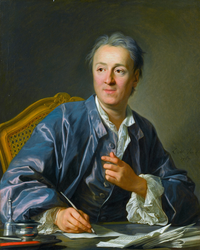More languages
More actions
This article is missing sources. Please do not take all information in this article uncritically, since it may be incorrect. If you have a source for this page, you can add it by making an edit. |
Denis Diderot | |
|---|---|
 | |
| Born | 5 October 1713 Langres, Champagne, France |
| Died | 31 July 1784 (aged 70) Paris, France |
| School tradition | Encyclopédistes French materialism |
| Nationality | French |
Denis Diderot (5 October 1713 – 31 July 1784) was the most eminent materialist thinker of the French Enlightenment and the driving force behind the Encyclopédie. For a quarter of a century, he published the monumental work with Jean le Rond d'Alembert, a project persecuted by the State and the Jesuits. Friedrich Engels wrote, “If anyone has enthusiastically dedicated his entire life to truth and to the right—in the best sense of the word—it was Diderot.”
Diderot was a prolific polymath who wrote on nearly every subject: natural science, mathematics, history, society, economics, law, morals, art, and literature. His thought evolved from strict Catholicism to deism to militant materialism and atheism, and finally to revolutionary bourgeois philosophy. His early works, like Philosophic Thoughts (1746) and An Essay on Blindness (1749), attacked the Church and led to his imprisonment, yet his philosophy was not confined to simple materialism. His later dialogues, such as A Conversation between d’Alembert and Diderot and D’Alembert’s Dream (both 1769), are considered masterpieces of materialist literature.
A visionary in science, Diderot is rightly seen as a precursor to Jean-Baptiste Lamarck and Charles Darwin. He clearly argued for the evolution of organisms from a common "primitive being" and the transformation of species, extending this idea of perpetual change to all matter in his Thoughts on the Interpretation of Nature (1754).
Beyond philosophy and science, Diderot was an eminent dramatist and master of prose who championed naturalism in art and theater. His witty novels and short stories were admired and translated by figures like Lessing, Schiller, and Goethe. Diderot was Karl Marx's favourite author and Engels also hailed his most famous work, Rameau’s Nephew (1762), as a "masterpiece of dialectics." His radical vision extended to social justice, where he famously called for a Black Spartacus-like figure to lead an uprising against slavery to provide reparations to the formerly enslaved.[1]
References[edit | edit source]
- ↑ Domenico Losurdo (2011). Liberalism: A Counter-History: 'Crisis of the English and American Models' (p. 168). [PDF] Verso. ISBN 9781844676934 [LG]
